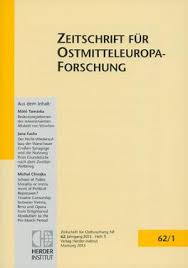Volksabstimmungen als ultima ratio? Die Plebiszite an Polens Grenzen nach dem Ende des Ersten Weltkriegs
The People’s Vote as ultima ratio? The Plebiscites on Poland’s Borders after the End of the First World War
Author(s): Benjamin ConradSubject(s): Constitutional Law, Political history, Government/Political systems, Pre-WW I & WW I (1900 -1919), Interwar Period (1920 - 1939)
Published by: Verlag Herder-Institut
Keywords: The People’s Vote as ultima ratio; The Plebiscites on Poland’s Borders; End of the First World War;
Summary/Abstract: After the end of the First World War, in the years 1919-20, the victorious Allied Powers instituted a total of thirteen plebiscites in order for the local inhabitants to clarify the allegiance of areas between states. Special notice should be taken of the external borders of the new Poland. After the Allies (already at the end of 1919) had renounced the plebiscite in East Galicia on the basis of the impending victory of the Red Army in the Russian Civil War, and had awarded East Galicia without the referendum to Poland, Polish foreign policy from the end of April 1920 aimed at the prevention of referendums in favor of negotiated settlements. The basis for this was the rather poor prospects for Poland to decide the matter in its favor through referendums, prospects which were further diminished through the Polish Soviet War that had begun at 25 April 1920. The policy of sabotage achieved partial successes: four of seven planned referendums were cancelled by the Allies, including when successive Polish diplomatic maneuvers against Czechoslovakia did not manage to secure better results through negotiations. Only with respect to the voting area of Vilna could a complete incorporation in 1922-23 be enforced. The three referendums on the German-Polish border which took place in 1920-21 were the only authentic ones, and ended as expected without a single victory for Poland. In Upper Silesia, the League of Nations decided after all it was for the good of Poland to divide the territory. That the National Democrat dominated Polish National Committee under the leadership of Roman Dmowski, which represented in Paris the Polish interests against those of the Allies, opposed the Plebiscite in a closed minded fashion, is already well researched. In contrast the attempts of the Polish side to bar the use of the Plebiscite already in 1920 has found scarcely any attention, and it once more shows the rejection of this political process. In these acts of rejection and sabotage, it was in no way merely about the basic question of the value of elections by referendum, but also about the enforcement of Polish claims that often did not coincide with the majority opinion of the affected population. That full hearings for the affected parties where they actually took place, turned out negative for Poland, can produce only little surprise. Because the National Democrats and Conservatives were in the majority in the Constitutional Sejm in Warsaw, the 1921 March Constitution of Poland did not contain any elements of direct democracy.
Journal: Zeitschrift für Ostmitteleuropa-Forschung
- Issue Year: 64/2015
- Issue No: 2
- Page Range: 174-194
- Page Count: 21
- Language: German

